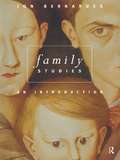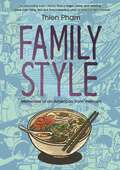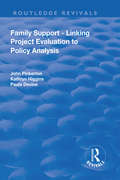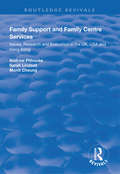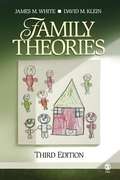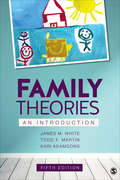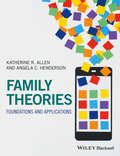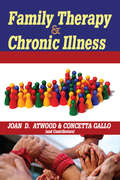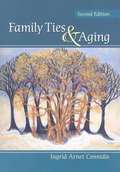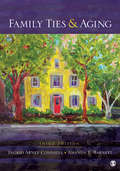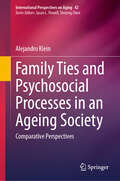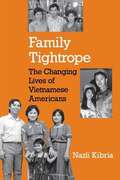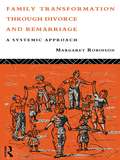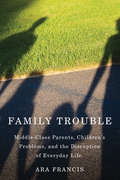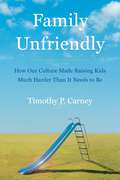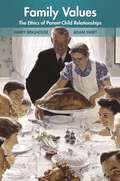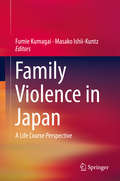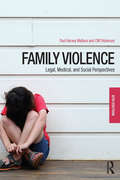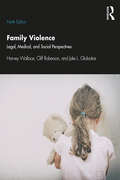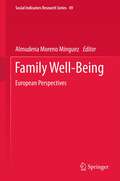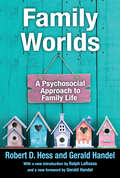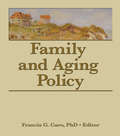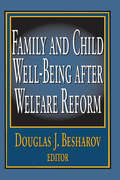- Table View
- List View
Family Studies: An Introduction
by Jon BernardesFirst published in 1997. Routledge is an imprint of Taylor & Francis, an informa company.
Family Style: Memories of an American from Vietnam
by Thien PhamA moving young adult graphic memoir about a Vietnamese immigrant boy's search for belonging in America, perfect for fans of American Born Chinese and The Best We Could Do!Thien's first memory isn't a sight or a sound. It's the sweetness of watermelon and the saltiness of fish. It's the taste of the foods he ate while adrift at sea as his family fled Vietnam.After the Pham family arrives at a refugee camp in Thailand, they struggle to survive. Things don't get much easier once they resettle in California. And through each chapter of their lives, food takes on a new meaning. Strawberries come to signify struggle as Thien's mom and dad look for work. Potato chips are an indulgence that bring Thien so much joy that they become a necessity.Behind every cut of steak and inside every croissant lies a story. And for Thien Pham, that story is about a search-- for belonging, for happiness, for the American dream.
Family Support - Linking Project Evaluation to Policy Analysis: Linking Project Evaluation To Policy Analysis (Evaluative Research In Social Work Ser.)
by John Pinkerton Kathryn HigginsThis title was first published in 2000: This book provides an exploration of the link between individualized project evaluation and policy analysis. The conceptual and legislative frameworks which contextualize family support are explored in full. By drawing on existing literature and examining the political and legislative aspects of family support the book aims to provide in one volume accessible and up to date information and discussion of key developments within family support, in the UK and internationally as well as within Northern Ireland where the research is set. Five family support settings are selected for close examination by the research and the key evaluation questions applied. The book details the methodology employed and explores exactly how the settings were organized for family support. Additionally the book seeks to identify needs in the context of family support across the range of settings by examining indicators of potential need. Services appropriate to family support were also analyzed across the range of settings. Finally the book reviews the settings against criteria for the evaluation and development of projects considered to be family support.
Family Support and Family Centre Services: Issues, Research and Evaluation in the UK, USA and Hong Kong (Routledge Revivals)
by Andrew Pithouse Sarah Lindsell Monit CheungPublished in 1998, the aim of this book is to identify and explore key themes and issues around the realm of welfare practice in child and family social work - that is, family centre services and related community-based types of provision. The text addresses the impact and effectiveness of family centres in supporting children, families and communities. Emphasis is placed on community based supportive/preventive family services and those that provide a closed access and therapeutic service aimed at families referred by social workers where children are at risk of abuse. Throughout, the focus is on best practice exemplified by research findings of family centre impacts and outcomes in the UK, the USA and Hong Kong.
Family Theories (Third Edition)
by James M. White David M. KleinBuilding upon the success of two previous bestselling editions, the Third Edition of Family Theories continues to be the ideal resource for readers wishing to develop an understanding of sophisticated ideas about families and marriages. Authors James White and David Klein have updated and revised each chapter based on readers’ suggestions and on developments in the area of family sociology and family studies. An incisive, thorough introduction to current and traditional theories of the family, this text balances the diversity and richness of a broad scope of scholarly work. New to the Third Edition Starts with a reorganized introductory chapter: The opening chapter has been restructured for increased clarity and to offer a better guide to utilizing theory to guide research and practice. Introduces a new chapter: Previous editions included seven major theoretical frameworks to explain variation in family life. The Third Edition welcomes the addition of an eighth framework on functionalist theory. Includes material on postmodernism: By placing information on postmodernism within the chapter on the feminist framework, the authors allow readers to see more clearly how these two intellectual movements relate to the study of families. Offers updates throughout: Significant additions to the “Variations” section of all chapters have been made to capture new theoretical developments. Restores several meta-theories: Deleted from the last chapter in the previous edition, several meta-theories, dealing with the type of causation, treatment of time, and the level of analysis, have been added back in this new edition. Intended Audience This text is designed for advanced undergraduate and graduate courses such as Family Theories, Family Systems & Theory, and Sociology of the Family in departments of family studies, sociology, and human development
Family Theories: An Introduction
by James M. White Todd F. Martin Kari AdamsonsFamily Theories: An Introduction by James M. White, Todd F. Martin, and new co-author Kari Adamsons provides an incisive, thorough primer to current theories of the family that balances the diversity and richness of a broad scope of scholarly work in a concise manner. This best-selling text draws upon eight major theoretical frameworks developed by key social scientists to explain variation in family life. These frameworks include social exchange and choice, symbolic-interaction, family life course development, systems, conflict, feminist, ecological, and functional theories. This new Fifth Edition includes suggestions for integrating theory to guide a research program and more applications for those going on to careers in the helping professions. With an increased focus on both classical theories as well as contemporary and emerging theories, this text challenges students to think about how families and family theories have changed over the last 70 years as well as where family scholarship is headed.
Family Theories: An Introduction
by James M. White Todd F. Martin Kari AdamsonsFamily Theories: An Introduction by James M. White, Todd F. Martin, and new co-author Kari Adamsons provides an incisive, thorough primer to current theories of the family that balances the diversity and richness of a broad scope of scholarly work in a concise manner. This best-selling text draws upon eight major theoretical frameworks developed by key social scientists to explain variation in family life. These frameworks include social exchange and choice, symbolic-interaction, family life course development, systems, conflict, feminist, ecological, and functional theories. This new Fifth Edition includes suggestions for integrating theory to guide a research program and more applications for those going on to careers in the helping professions. With an increased focus on both classical theories as well as contemporary and emerging theories, this text challenges students to think about how families and family theories have changed over the last 70 years as well as where family scholarship is headed.
Family Theories: Foundations and Applications
by Katherine R. Allen Angela C. HendersonFamily Theories: Foundations and Applications presents a comprehensive and accessible approach to the most current perspectives in the field of family theory. Integrates classic and contemporary writings on family theories Features compelling case studies drawn from the authors' experiences working with thousands of students Represents an integrative use of theory, research, and practice Utilizes the metaphor of "developing your theory app" to translate complex academic ideas into accessible, student-friendly language
Family Therapy and Chronic Illness
by Joan AtwoodTreatment for the chronically ill has traditionally focused on physical factors and symptoms, despite the fact that chronic illness also affects life in an emotional and spiritual way. The approach toward treatment described in this volume addresses all aspects of a patient's life, including their interpersonal experiences and relationships, presenting family therapists and family physicians as part of the same treatment team. This volume thus provides a foundation for understanding the role illness plays in family systems. The meaning an individual gives to an illness is profoundly influenced by and influences that person's social world. In turn, social culture and social networks both shape and are shaped by the individual's experiences. Exploring how the meaning of chronic illness is defined tells us much about the individual's interpersonal relations and the resultant meaning given to the person's illness. As a consequence, family therapy must be an integral part of the treatment plan for chronically ill patients . Family Therapy and Chronic Illness approaches chronic illness from a leading-edge perspective. This approach enables therapists to listen attentively to complicated narratives. Because these stories, feelings, and emotions are difficult to describe, the clients have demanding "telling" tasks while therapists have demanding "listening" tasks. This book sends an important message not just about the chronically ill, but also about their families, therapists, and doctors, and how they can work together to develop the best treatment plan possible.
Family Ties and Aging (2nd Edition)
by Ingrid Arnet ConnidisThis textbook covers issues of family ties and aging broadly to provide an integrated and thorough representation of what we know from the current research. The text includes groups and relationships exploring such neglected populations as single, divorced, and childless older people and their family relationships, sibling relationships among the elderly, live-in partnerships not formalized by marriage, and the kinds of family ties forged by gay and lesbian persons over the life course.
Family Ties and Aging: Moody: Aging 6e + Connidis: Family Ties And Aging 2e
by Ingrid Arnet Connidis Amanda E. BarnettProviding an integrated and thorough representation from current research and contemporary society, Family Ties and Aging shows how pressing issues of our time—an aging population, changing family structures, and new patterns of work-family balance—are negotiated in the family lives of middle-aged and older adults. Focusing on key questions such as "How do current trends and social arrangements affect family relationships?" and "What are the implications of what we know for future research, theory, practice, and policy?", authors Ingrid Arnet Connidis and Amanda E. Barnett explore groups and relationships that are typically overlooked, including the unique family situations of older single and childless persons, sibling ties, older lesbian and gay adults, and new forms of intimate relationships. The Third Edition is thoroughly updated to include the latest research and theoretical developments, recent media coverage of related issues, and new information on intimate relationships in later life and elder neglect/abuse.
Family Ties and Aging: Moody: Aging 6e + Connidis: Family Ties And Aging 2e
by Ingrid Arnet Connidis Amanda E. BarnettProviding an integrated and thorough representation from current research and contemporary society, Family Ties and Aging shows how pressing issues of our time—an aging population, changing family structures, and new patterns of work-family balance—are negotiated in the family lives of middle-aged and older adults. Focusing on key questions such as "How do current trends and social arrangements affect family relationships?" and "What are the implications of what we know for future research, theory, practice, and policy?", authors Ingrid Arnet Connidis and Amanda E. Barnett explore groups and relationships that are typically overlooked, including the unique family situations of older single and childless persons, sibling ties, older lesbian and gay adults, and new forms of intimate relationships. The Third Edition is thoroughly updated to include the latest research and theoretical developments, recent media coverage of related issues, and new information on intimate relationships in later life and elder neglect/abuse.
Family Ties and Psychosocial Processes in an Ageing Society: Comparative Perspectives (International Perspectives on Aging #42)
by Alejandro KleinThis book contributes to the discussion on the ageing society by addressing the new psycho-social structures of the ageing society, the problems around family bonds and ties, and the structures of care and protection. The book sheds light on the new roles of grandparents and new grandparents, and the empowerment and resilience initiatives, thereby providing a broad discussion of what the ageing society implies in psychosocial terms. These issues are addressed in an interdisciplinary way, but also in an approach that is also rare, comparing different realities between Europe and Latin America. The [basis of the] English translation of this book from its Spanish original manuscript was done with the help of artificial intelligence. A subsequent human revision of the content was done by the author.
Family Tightrope: The Changing Lives of Vietnamese Americans
by Nazli KibriaIn recent years the popular media have described Vietnamese Americans as the quintessential American immigrant success story, attributing their accomplishments to the values they learn in the traditional, stable, hierarchical confines of their family. Questioning the accuracy of such family portrayals, Nazli Kibria draws on in-depth interviews and participant observation with Vietnamese immigrants in Philadelphia to show how they construct their family lives in response to the social and economic challenges posed by migration and resettlement. To a surprising extent, the "traditional" family unit rarely exists, and its hierarchical organization has been greatly altered.
Family Transformation Through Divorce and Remarriage: A Systemic Approach
by Margaret RobinsonFamily Transformation Through Divorce and Remarriage is the first book to look thoroughly at the complete divorce-remarriage-stepfamily cycle in the context of demographic data, the legal process and the theoretical framework. For each phase of the cycle, the author describes the stages of development, summarises the relevant research and illustrates the effects on family members with case examples.
Family Trouble
by Ara FrancisOur children mean the world to us. They are so central to our hopes and dreams that we will do almost anything to keep them healthy, happy, and safe. What happens, then, when a child has serious problems? In Family Trouble, a compelling portrait of upheaval in family life, sociologist Ara Francis tells the stories of middle-class men and women whose children face significant medical, psychological, and social challenges. Francis interviewed the mothers and fathers of children with such problems as depression, bi-polar disorder, autism, learning disabilities, drug addiction, alcoholism, fetal alcohol syndrome, and cerebral palsy. Children's problems, she finds, profoundly upset the foundations of parents' everyday lives, overturning taken-for-granted expectations, daily routines, and personal relationships. Indeed, these problems initiated a chain of disruption that moved through parents' lives in domino-like fashion, culminating in a crisis characterized by uncertainty, loneliness, guilt, grief, and anxiety. Francis looks at how mothers and fathers often differ in their interpretation of a child's condition, discusses the gendered nature of child rearing, and describes how parents struggle to find effective treatments and to successfully navigate medical and educational bureaucracies. But above all, Family Trouble examines how children's problems disrupt middle-class dreams of the "normal" family. It captures how children's problems "radiate" and spill over into other areas of parents' lives, wreaking havoc even on their identities, leading them to reevaluate deeply held assumptions about their own sense of self and what it means to achieve the good life. Engagingly written, Family Trouble offers insight to professionals and solace to parents. The book offers a clear message to anyone in the throes of family trouble: you are in good company, and you are not as different as you might feel...
Family Unfriendly: How Our Culture Made Raising Kids Much Harder Than It Needs to Be
by Timothy P CarneyThe bestselling author of Alienated America traveled the country asking families and experts the same two questions: Why is parenting so hard now? And why are the results so bad?Our culture tells parents there's one best way to raise kids: enroll them in a dozen activities, protect them from trauma, and get them into the most expensive college you can. If you can't do that, don't bother.How is that going? Record rates of anxiety, depression, medication, debts, loneliness and more. In Family Unfriendly, bestselling author and Washington Examiner columnist Timothy P. Carney says it's time to end this failed experiment in overparenting.Have more kids, have more fun, cancel the travel soccer games, let your kids wander off, and give them deeper sources of meaning than material success. This is an old-fashioned view, but every day the evidence validates it. Drawing on rigorous research—both as a reporter and as a dad of six—Carney demonstrates why modern parenting is so misguided. The high standards set for modern American parenting are unrealistic and setting parents—and our kids—up to fail.Researched over three years and written in between rec baseball games and church picnics where nobody was watching the kids, Family Unfriendly is deeply wise, energetically told, and destined to be the most consequential book about parenting in years.
Family Values: The Ethics of Parent-Child Relationships
by Adam Swift Harry BrighouseThe family is hotly contested ideological terrain. Some defend the traditional two-parent heterosexual family while others welcome its demise. Opinions vary about how much control parents should have over their children's upbringing. Family Values provides a major new theoretical account of the morality and politics of the family, telling us why the family is valuable, who has the right to parent, and what rights parents should—and should not—have over their children.Harry Brighouse and Adam Swift argue that parent-child relationships produce the "familial relationship goods" that people need to flourish. Children's healthy development depends on intimate relationships with authoritative adults, while the distinctive joys and challenges of parenting are part of a fulfilling life for adults. Yet the relationships that make these goods possible have little to do with biology, and do not require the extensive rights that parents currently enjoy. Challenging some of our most commonly held beliefs about the family, Brighouse and Swift explain why a child's interest in autonomy severely limits parents' right to shape their children's values, and why parents have no fundamental right to confer wealth or advantage on their children.Family Values reaffirms the vital importance of the family as a social institution while challenging its role in the reproduction of social inequality and carefully balancing the interests of parents and children.
Family Violence in Japan
by Fumie Kumagai Masako Ishii-KuntzThis book provides fresh sociological analyses on family violence in Japan. Aimed at an international audience, the authors adopt a life course perspective in presenting their research. Following a comprehensive overview of family violence in Japan in both historical and contemporary contexts, it then goes on to define the extent and causes of child abuse, intimate partner violence, filial violence, and elder abuse. In doing so, the book is the first of its kind to look at these different types of violence in Japanese families and simultaneously incorporate historical development of individuals and intergenerational factors. Furthermore, its reliance on the life course perspective enables readers to obtain a broader understanding of family violence in the country. Written by five Japanese family sociologists who have identified various major sociocultural characteristics that either induce or suppress family violence in Japan, it is a valuable resource not only to scholars and students of the topic, but also to those specializing in sociology, psychology, anthropology and comparative family studies around the globe.
Family Violence: Legal, Medical, and Social Perspectives
by Cliff Roberson Paul Harvey WallaceFamily Violence: Legal, Medical, and Social Perspectives examines the entire spectrum of family violence, focusing on social processes and social relationships. The eighth edition is a multidisciplinary introduction to the study of domestic violence that guides readers to a better understanding of the challenges involved in reducing or eliminating violence. The new edition includes more information on PTSD and head trauma, a new section in children witnessing domestic violence, more international perspectives, which allow students to understand that family violence crosses borders and cultures, and a series of Promising Practices boxes that bring professional knowledge and accomplishments into the classroom.
Family Violence: Legal, Medical, and Social Perspectives
by Cliff Roberson Harvey Wallace Julie L. GlobokarFamily Violence: Legal, Medical, and Social Perspectives examines the entire spectrum of family violence, focusing on social processes and social relationships. The Ninth Edition of Family Violence is a comprehensive updated version of the classic text on family violence. In addition to the updates to each chapter, the new edition features new research, comments, and discussions on the #MeToo Movement, same gender couples, elder abuse, stalking, partner abuse, and law enforcement’s updated responses to these incidents. The new edition, however, still retains the coverage of the seminal research studies that are the bases of popular theories on partner and family violence. In the new edition, the authors have sought to make the material more understandable to the readers so that instructors will not need to waste valuable class time explaining the text.
Family Well-Being
by Almudena Moreno MinguezIn the international literature there is a broad scope for comparative research on the welfare regime, family change and gender relations, but we have no book that comprehensively collects the main research that has been conducted from the perspective of family well-being. Thus, this volume focuses on the comparative analyse of family and well-being in a European perspective, a dimension which literature has not covered till the present. This book collects the researches done in Europe on family well-being and compares family change and well-being in different institutional and cultural contexts. It takes a deeper look at early evidence of family well-being and presents a compilation of findings from the main researchers on this topic. A broad range of topics is covered from the theorizing of children's well-being to the development of specific measures of family well-being. The book also outlines pivotal methodological and conceptual issues. A distinguished, international group of researchers provide insights into the dynamics of family change and well-being, using indicators as a means to confront new phenomena as well as to bridge data and theory.
Family Worlds: A Psychosocial Approach to Family Life
by Gerald HandelHow does a family function? How does a family make a distinctive life of its own while living according to the values of society? In what ways is a family a unit when all its members have personalities of their own? How can we understand diversity among families?Robert D. Hess and Gerald Handel sensitively explore the dynamics of family life in five narrative case studies. The Clarks, Lansons, Littletons, Newbolds, and Steeles are all "typical" families with representative social, cultural, and psychological problems. By simultaneously studying each family as a small group and as a set of individual personalities, the authors have captured the interplay between personality and family as each group works out its own special way of coping with its problems. Further, they have formulated several principles of family functioning that help focus comparison.Family Worlds was the first, and is still one of the few studies, to interview each member of the family, giving equal weight to children as well as to adults, so each family member's perspective is factored into Hess and Handel's family portraits. A new introduction to the Transaction edition illuminates just how significant this ground-breaking study still is today and highlights the new implications it has for today's families as well as emerging approaches.
Family and Aging Policy
by Francis G. CaroLearn how public policies can help families provide the care their elderly relatives needFamily and Aging Policy examines how public initiatives to assist the elderly in the United States, Canada, Singapore, Denmark, and Sweden can impact families who provide them with long-term care. For the majority of older people, the aging experience involves their families directly and indirectly, affecting income security, housing, and health care. This unique book addresses the aging issues that matter most to families struggling to deal with the demands of care giving and provides answers on how the public sector can help.As the traditional nuclear family becomes a memory and the notion of extended family disappears, the need for public interventions to help the elderly increases. A significant number of people grow old without families they can depend on. Others have families who want to help, but lack the financial means or the housing needed to provide care. Family and Aging Policy offers options on how families and formal services can share responsibilities, including how families can juggle jobs and care giving, the effects of the Family and Medical Leave Act, consumer-directed service options, community-based care programs, accessory dwelling units and zoning ordinances, and provisions for caregiver support in each of the 50 United States and the District of Columbia.Family and Aging Policy examines: extensive welfare programs in Sweden publicly funded home care programs in Denmark family-oriented social policies in Singapore shared responsibilities of families and formal services in Canada the Administration on Aging&’s National Family Caregiver Support program in the United States California Caregiver Resource Centers and much more!Family and Aging Policy is an invaluable tool for researchers and policy analysts working in family policy issues and as an essential supplemental text for course work in gerontology, sociology, family relations, and social work.
Family and Child Well-being After Welfare Reform
by Douglas J. BesharovSince their historic high in 1994, welfare caseloads in the United States have dropped an astounding 59 percent--more than 5 million fewer families receive welfare. Family and Child Well-Being after Welfare Reform, now in paperback, explores how low-income children and their families are faring in the wake of welfare reform. Contributors to the volume include leading social researchers. Can existing surveys and other data be used to measure trends in the area? What key indicators should be tracked? What are the initial trends after welfare reform? What other information or approaches would be helpful? The book covers a broad range of topics: an update on welfare reform (Douglas J. Besharov and Peter Germanis); ongoing major research (Peter H. Rossi); material well-being, such as earnings, benefits, and consumption (Richard Bavier); family versus household (Wendy D. Manning); fatherhood, cohabitation, and marriage (Wade F. Horn); teenage sex, pregnancy, and nonmarital births (Isabel V. Sawhill); child maltreatment and foster care (Richard J. Gelles); homelessness and housing (John C. Weicher); child health and well-being (Lorraine V. Klerman); nutrition, food security, and obesity (Harold S. Beebout); crime, juvenile delinquency, and dysfunctional behavior (Lawrence W. Sherman); drug use (Peter Reuter); mothers' work and child care (Julia B. Isaacs); and the activities of the U.S. Department of Health and Human Services (Don Winstead and Ann McCormick). When welfare reform was first debated, many people feared that it would hurt the poor, especially children. The contributors find little evidence to suggest this has occurred. As time limits and other programmatic requirements take hold, more information will be needed to assess the condition of low-income families after welfare reform. This informative volume establishes a baseline for that assessment.
